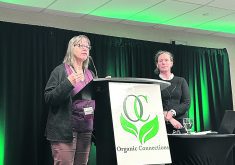Sector says it is vital that organic producers know what they’re growing now that Canada has relaxed its gene editing rules
Leaders in Canada’s organic industry want a mandatory public federal registry for seeds developed with gene-editing technology.
In an open letter to federal Agriculture Minister Marie-Claude Bibeau, the group said a registry is “a necessary tool for the viability of organic food and farming. Without this transparency, we cannot conduct our business.”
Dozens of organic businesses and groups have signed the letter, including the Canadian Organic Trade Association, Canadian Organic Growers and Nature’s Path Foods.
Organic leaders promoted the letter in March and early April, encouraging individuals and organizations to sign.
Read Also

Agri-business and farms front and centre for Alberta’s Open Farm Days
Open Farm Days continues to enjoy success in its 14th year running, as Alberta farms and agri-businesses were showcased to increase awareness on how food gets to the dinner plate.
Marla Carlson, executive director of SaskOrganics, said the crux of the issue is the organic standard. Organic farmers are not permitted to plant gene-edited seeds. There could be consequences if an organic farmer planted a gene-edited seed by mistake or if an organic shipment contained gene-edited grain.
“The decision was taken by the sector that seeds that are developed using gene-editing technology would be included in our definition of GMOs, or genetic engineering. In terms of our standard, they are the same,” she said.
“We can’t have it because of our standards.”
Detection of gene-edited varieties in an organic shipment could be especially problematic in markets such as Europe, where regulators and a large share of consumers are hostile to biotechnology.
Gene editing is a technique in which scientists precisely delete or change the genetic sequence of a particular crop to achieve a certain trait, such as increased disease resistance.
It’s different from transgenic, or genetic modification, technology, in which a gene from another species, such as a bacterium, is inserted into the DNA of a plant to achieve a desired trait.
Most plant scientists describe gene editing as a modern plant breeding tool or a more precise form of conventional plant breeding.
Last year, Health Canada adopted a similar position.
In May 2022, it proposed that seeds developed with gene-editing will be regulated similarly to conventionally bred seeds unless the gene-editing involves foreign DNA.
In most cases, gene-edited crops will not require a pre-market safety assessment.
“This will open up the very real possibility of dramatic improvements for small- and large-acre crops alike, from productivity improvements to new solutions for emerging pest pressures to advances in food and fuel crops that will benefit the entire value chain including consumers,” Rick White, chair of the Canada Grains Council, said last year.
However, the organic sector has a different position than Health Canada.
It believes gene-edited and transgenic seeds are in the same category and should be regulated in the same manner.
Health Canada has proposed a voluntary transparency program for gene-edited plants.
“The department invites developers to provide it with concise information about their product. The department will publish this information online for public access,” Health Canada said. “The goal… is to provide people in Canada with information on the types of gene-edited plant products that may be used as food in the Canadian market.”
Organic leaders say that’s insufficient. Instead, they argue, the gene-edited registry should be mandatory.
“The bottom line for us is the registry,” Carlson said, explaining that organic producers and buyers need to know what they are using or purchasing.
CropLife Canada, which represents the crop science sector, said seed companies support the Health Canada transparency initiative.
“The seed sector has long been responsible for, and successful in, the delivery of information to farmers about seed varieties,” a CropLife spokesperson said. “This includes successfully providing information about GMOs for the last 30 years. Information on gene edited products will be delivered building on this history of success.”
The seed industry will continue to support all growers, they added.
“Farmers and value-chain members who have specific contractual obligations or are involved in production systems like organic… may need to identify if a variety meets their needs…. The seed sector will continue to deliver the necessary information to enable those choices.”
















